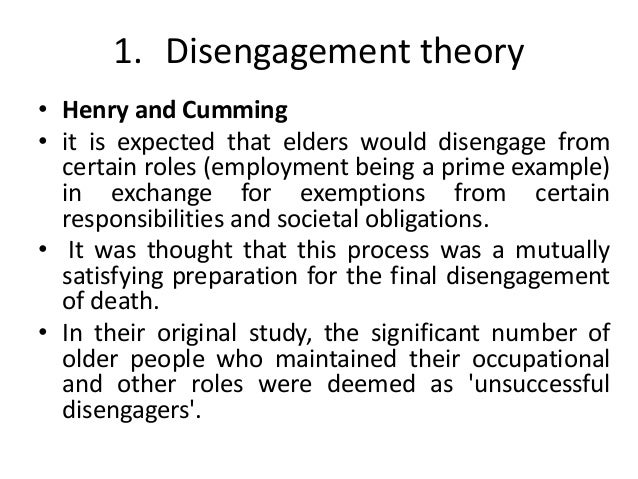

Havighurst: Robert James Havighurst (Jin De Pere, Wisconsin – Januin Richmond, Indiana) was a professor, physicist, educator, and aging expert.

Postulate six: Man’s central role is work, and woman’s is marriage and family.

When society is ready and the individual is not, the result of the disjunction is usually disengagement. When the individual is ready and society is not, a disjunction between the expectations of the individual and of the members of this social systems results, but engagement usually continues. When neither is ready, continuing engagement results. Postulate five: When both the individual and society are ready for disengagement, complete disengagement results.Sunday Morning Stroll in Piazza del Popolo: The process of aging is greatly facilitated when older people pursue hobbies and relationships, and generally lead a more active lifestyle. This kind of disengagement is affected by the individual, prompted by either ego changes or the organization, which is bound to organizational imperatives, or both. To satisfy these demands, age-grading ensures that the young possess sufficient knowledge and skill to assume authority and that the old retire before they lose their skills. However, success in an industrialized society demands certain knowledge and skill. For example, aging, a form of ego change, causes knowledge and skill to deteriorate. Postulate four: The individual’s life is punctuated by ego changes.Postulate three: Because men have a centrally instrumental role in America, and women a socioemotional one, disengagement differs between men and women.Consequently, this form of disengagement becomes a circular or self-perpetuating process. Postulate two: Because individual interactions between people strengthen norms, an individual who has fewer varieties of interactions has greater freedom from the norms imposed by interaction.As a result, every person will lose ties to others in his or her society. Postulate one: Everyone expects death, and one’s abilities will likely deteriorate over time.They formulate their argument along nine postulates to explain why it is rational for individuals who know that death is approaching and who have seen friends of their age pass to begin to anticipate their own deaths and disengage.Įlderly Woman: Disengagement theory suggests that adults become increasingly withdrawn as they get older. In Growing Old, Cumming and Henry develop a logical argument for why older adults would naturally disengage from society. It was originally formulated by Elaine Cumming and Warren Earl Henry in their 1961 book Growing Old. \)ĭisengagement theory was the first theory of aging developed by social scientists.


 0 kommentar(er)
0 kommentar(er)
